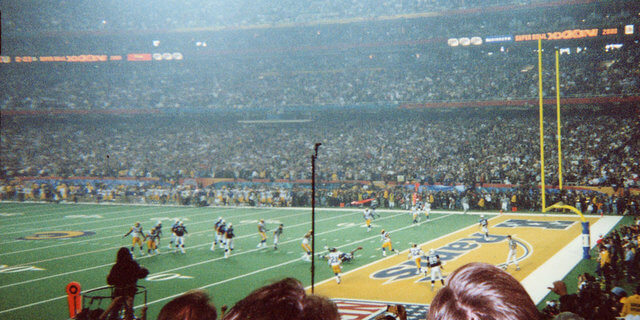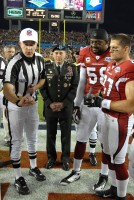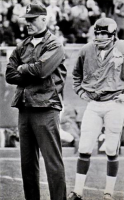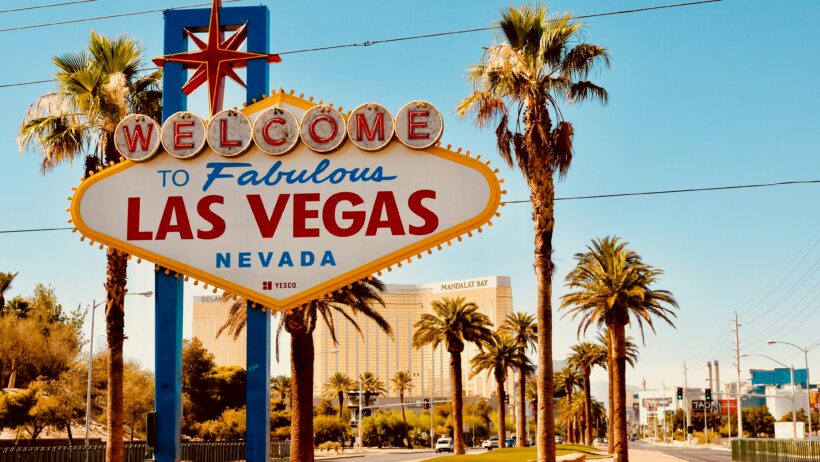The 6 Unluckiest Franchises in Super Bowl History
By Eric Thompson in NFL Football
Updated: January 17, 2018 at 9:39 am ESTPublished:

This year marks the 50th edition of the big game: the Super Bowl. There are only 32 teams in the NFL, so by my quick, albeit terrible math, that seems like enough opportunities for each franchise to have at least one title. Sadly, the NFL is not big on equity. In fact, six teams (Steelers, Cowboys, 49ers, Patriots, Giants, Packers) have combined to win 28 of the first 49 Lombardi Trophies. So much for sharing!
Perhaps the worst part is, all the success of the NFL’s premier franchises has to come at the expense of the little guy. Forty percent of the league has yet to win a Super Bowl title. But while some teams haven’t even gotten invited to the party, a few unlucky teams have been close enough to taste the victory pie, only to get bounced in heartbreaking fashion.
This list is here to honor the uncelebrated, the teams that never got the right bounces or made the big plays. Here are the unluckiest franchises in the history of the big game.
(Since a team has to have played in a Super Bowl to make this list, we apologize to Browns and Lions fans. There is no doubt that it’s terrible to be you guys, though, as you both reminded us last week.)
6. Tennessee Titans (Super Bowl record: 0-1)
The 1999 Titans were lucky to even reach their first Super Bowl in franchise history, requiring a Music City Miracle to get through the Wild Card round. But this plucky Tennessee team ran through the rest of the AFC playoffs setting up a date with the “Greatest Show on Turf”: the St. Louis Rams.
The Titans defense did their part, limiting one of the greatest offenses of all time to just 16 points late in the fourth quarter. But after Tennessee tied the game on a field goal with 2:12 left in the game, Kurt Warner hit Isaac Bruce on a 73-yard TD on the Rams’ very next play to retake the lead.
Perhaps that worked out for the best, as it left Steve McNair 1:48 and one timeout to drive 88 yards down the field and tie the game. As most Titans fans will remember, though, Tennesse only got 87 yards. In a play that would’ve driven John Madden crazy, McNair hit Kevin Dyson short of the goal line and he was tackled at the one.
It was one of the closest Super Bowl losses of all time, but the Titans haven’t come close to returning since. Perhaps the worst part of that season was that it made Tennessee brass think Jeff Fisher was a great coach. And, thus, the Titans were doomed to a decade of mediocrity.
5. Arizona Cardinals (Super Bowl record: 0-1)
To those of you who are relatively new to the NFL, here’s all you need to know about the Arizona Cardinals: with their win on Thursday, these last three seasons under Bruce Arians are officially the franchise’s most successful run in its 95-year history. So yeah, Cardinals fans don’t exactly know what its like to cheer for a winner.

Perhaps that’s why they don’t rank higher on this list. While their Super Bowl XLIII loss was one of the toughest to swallow, it’s unlikely Arizona fans thought they could actually win that game … until they took a 23-20 lead late in the fourth quarter against the touchdown-favored Steelers. After all, this was a 9-7 team that backslid into the playoffs before Larry Fitzgerald led them on a run unlike any other. Unfortunately for the Cards, Fitzgerald didn’t play defense.
Ben Roethlisberger took over at his own ten-yard line after a holding call and proceeded to drive Pittsburgh down the field. The Cardinals D missed some glorious opportunities to stop the drive, including almost sacking Roethlisberger at his one-yard line. Safety Aaron Francisco also fell down on a play that allowed the Steelers to reach the five-yard line. But as mistake-prone as this D was, it’s unlikely even the ’85 Bears could’ve stopped the game winning catch by Santonio Holmes.
So far, of all the teams to make the Super Bowl only once, Arizona’s loss was the most gut-wrenching. Sorry Carolina!
4. Philadelphia Eagles (Super Bowl record: 0-2)
Marred in perhaps the city’s worst stretch of professional sports ever, it might be fun to think back to a time when the Eagles organization was failing on the big stage. The Eagles have reached the precipice twice before “Phillying” it up. (And yes, the city has become a verb synonymous with defeat.)
First came Super Bowl XV, a classic matchup we’ve already hit on, where the Eagles were actually three-point favorites. But turnovers, ill-timed penalties, and general buffoonery cost them a chance at even making the game close, dropping a 27-10 decision to the Raiders.
It would be another 24 years until the “City of Brotherly Love” got another chance at a Lombardi Trophy, this time facing a New England Patriots team that was looking to cement its status as a dynasty. The Eagles lost 24-21, but actually hung in pretty well until a clock meltdown in the fourth quarter cost them a chance at tying up the game.
Perhaps the saddest part of the Eagles’ history is how many Super Bowl losses they could’ve had. Under Andy Reid, the team famously lost four NFC Championship games! There’s nothing sadder than falling short of falling short.
3. Minnesota Vikings (Super Bowl record: 0-4)

Unless you’re over the age of 40, you’ve never even seen the Vikings play in a Super Bowl, which is why it’s crazy to think they’ve somehow lost four of them! But back in the Super Bowl’s infancy, Minnesota was a regular player in the big game, qualifying for a third of the first dozen.
However, the Vikes never really had a knack for the bright lights, typically getting their asses kicked on Super Sunday. In fact, in their four appearances, they averaged about 8.5 points a game: not exactly a winning formula.
It’s not all Minnesota’s fault, though. They were typically a pretty great team; they just happened to play some historically fantastic opponents. In their last three appearances alone, they lost to the 1973 Miami Dolphins (one year removed from their perfect season), the 1974 Pittsburgh Steelers (the first of four titles the Steel Curtain would win in the 70s), and the 1976 Oakland Raiders (a one-loss team coached by John Madden that was easily the best in franchise history).
The Vikings best chance may have come in their first appearance, a game in which they were 12.5-point favorites! However, that line was largely a result of the lack of respect the NFL had for the AFL champion Kansas City Chiefs. In one of the bigger upsets in Super Bowl history, coach Hank Stram and the Chiefs steamrolled Minnesota, 23-7.
2. Cincinnati Bengals (Super Bowl record: 0-2)
While the Bengals have been to the promised land half as many times as the Vikes, they’ve received double the heartbreak. But perhaps that’s to be expected when both of your shots at a title came against one of the best to ever do it: Joe Montana.
Cincy’s first loss came in Super Bowl XVI, before Montana was ever a household name. It was the first appearance for both franchises, with San Fran a slight one-point favorite. The Bengals had the league’s reigning MVP, Ken Anderson, and even ended up scoring more touchdowns; but four turnovers buried them in a 26-21 loss.
The Bengals would get a shot at revenge seven years later, with a brand new cast of characters: Boomer Esiason, Ickey Woods, Eddie Brown, and more. But things would go wrong for Cincy before the game even started. Fullback Stanley Wilson was caught using cocaine the night before the game and had to be left off the roster.
Then early in the first quarter, the Bengals best defender, Tim Krumrie, went down with a gruesome leg injury.
Despite the setbacks, Cincinnati held a 16-13 lead with just over three minutes left in the fourth quarter. But then Montana did that whole “most clutch QB ever” thing he’s known for, driving the Niners 92 yards for his third Lombardi Trophy.
The Bengals have only won one playoff game since that day…
1. Buffalo Bills (Super Bowl record: 0-4)
They say history never remembers the losers. But when you lose in spectacular fashion like the Buffalo Bills, history makes an exception.
In the early 90s, the Bills became the only team in NFL history to qualify for four straight Super Bowls. Then they became the first team to lose four straight Super Bowls. While you’d think each loss would hurt exponentially more than the last, none proved more devastating than the first.
Buffalo entered Super Bowl XXV as seven-point favorites, and deservedly so. They had the highest scoring offense in the league, and were facing a New York Giants team that was led by a backup quarterback in Jeff Hostetler and a 33-year old running back, Ottis Anderson. But the Giants had one edge: great coaching.

Bill Parcells’ team owned the time of possession battle, 40:33-19:27, and the Giants defense (coordinated by some kid named Bill Belichick) held Buffalo’s passing game in check. The Bills still had a chance to win it late, but I’m sure you know what happened. It’s a little play infamously known as “Wide Right.”
That loss seemed to shatter the Bills’ psyche. The next three Super Bowl appearances got progressively worse. From Thurman Thomas misplacing his helmet in Super Bowl XXVI, to back-to-back butt-kickings from the Cowboys (where the Bills’ biggest play was stopping Leon Lett). Buffalo even held a 13-6 lead at halftime in their final Super Bowl appearance, but imploded in the second half.
All told, after the Giants’ upset, the Bills lost the next three Super Bowls by a combined score of 119-54 and committed an astonishing 17 turnovers in those games.
So ask yourself this Bills fans: do you really miss the playoffs that much?
(Photo Credit: Baer Tirkel (http://www.flickr.com/photos/sweetmojo/2348437537/) Photo may appear cropped. [CC BY 2.0 (http://creativecommons.org/licenses/by/2.0)], via Wikimedia Commons)

Sports Writer
Eric Thompson has been with SBD since 2015, serving as a sports betting expert in NFL, NHL, NBA, and MLB. If you want someone who eats, sleeps, and breathes sports news and betting, Eric is your man. Having studied economics at university, he understands what value is and how to spot it.



